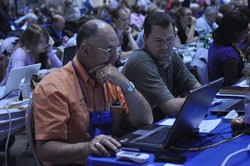After nearly two hours of debate on Thursday evening, the 219th General Assembly (2010) agreed to refrain from holding national meetings in states where travel by immigrant Presbyterians or Presbyterians of color might subject them to harassment due to legislation.
The overture, which passed 420-205, was presented in light of a recently enacted Arizona law that many feel unfairly targets Hispanic Americans.
Former moderator of the General Assembly, Rick Ufford-Chase (2004) spoke in support of the measure, as did former moderator of the General Assembly John Fife (1992), who currently lives in Arizona.
“Racism must be confronted with action,” said Fife.
Ufford-Chase cited PC(USA)’s “historic concern for those who stand on the fringe of our society.”
Those opposing the recommendation said the wording was “too vague” and that the church “did not need to impose such harsh restraint.”
The 220th General Assembly is scheduled for Pittsburgh in 2012. Pennsylvania has immigration laws similar to those in Arizona. Stated Clerk the Rev. Gradye Parsons said the General Assembly would take a “serious look” at the situation if the need arises.
“In the end, we would follow the directions of the Assembly,” said Parsons.
The Assembly also approved recommendations:
- for an immediate moratorium on all executions in all jurisdictions that impose capital punishment;
- to establish funding and make educational resources available for a theological wetlands education center in the Presbytery of South Louisiana;
- to encourage the church at every level to become informed and active in preventing gun violence;
- to continue to support the work of the Climate for Change Task Force in anticipation of their report to the 220th General Assembly (2012);
- to appoint a committee of nine persons to study the Nature of the Church for the 21st Century;
- to bring to the attention of the church significant trends and developments in human rights, particularly in the areas of trafficking, detention of immigrants and the continuing problem of torture;
- to affirm the Charter of Compassion;
- to lift up the “Call to Restore the Creation,” originally adopted as part of Restoring Creation for Ecology and Justice by the 202nd General Assembly (1990) in recognition of its continuing importance.

